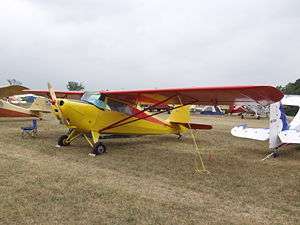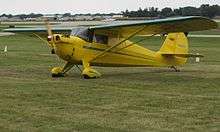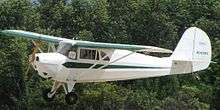Aeronca 50 Chief
The Aeronca Model 50 Chief was an American light plane of the late 1930s. Consumer demand for more comfort, longer range and better instrumentation resulted in its development in 1938, powered by a 50-horsepower (37-kilowatt) Continental, Franklin or Lycoming engine. A 65-horsepower (48-kilowatt) Continental engine powered the Model 65 Super Chief, which was also built in a flight trainer version, the Model TC-65 Defender, with its rear seat positioned nine inches (23 centimeters) higher than the front for better visibility.
| Models 50 and 65 | |
|---|---|
 | |
| Model 65-CA | |
| Role | Civil utility aircraft |
| Manufacturer | Aeronca |
| First flight | 1938 |
Variants
- Aeronca 50C Chief
- (1938) An improved KCA with a wider cabin, powered by a 50 hp (37 kW) Continental A-50. 248 built. The first light-plane to fly non-stop from Los Angeles to New York City, on 29–30 November 1938, covering 2,785 mi (4,482 km)miles in 30hours 47minutes, averaging 90 mph (145 km/h), with an impressive fuel cost-per-mile of about one cent.
- Aeronca 50F Chief
- (1938) powered by a 50 hp (37 kW) Franklin 4AC. 40 built.
- Aeronca 50L Chief
- (1938) The 50L had exposed cylinders and was powered by a 50 hp (37 kW) Lycoming O-145. 65 built.
- Aeronca 50LA Chief
- The 50LA, with Lycoming engine, had a closed cowling. 20 built.
- Aeronca 50M Chief
- (1938) A single 50M was built, powered by a 50 hp (37 kW) Menasco M-50.
- Aeronca 50TC
- (1939) The first tandem Aeronca, introduced as competition for the Piper Cub, powered by a 50 hp (37 kW) Continental A-50. 16 built.
- Aeronca 50TL Tandem
- The 50TL was powered by a 50 hp (37 kW) Lycoming O-145. 33 built.
- Aeronca 60TF
- (1940) Essentially the same as the50TC, powered by a 60 hp (45 kW) Franklin 4AC conferring slightly increased performance.
- Aeronca 60TL Tandem
- Powered by a 60 hp (45 kW) Lycoming O-145. 118 built for the USAAF as the O-58B, powered by a 65 hp (48 kW) Continental A-65.

Aeronca 65C
- Aeronca 65C Chief
- (1938) Powered by a 65 hp (48 kW) Continental A-65. 279 were built, many of which were impressed by the USAAF as O-58/L-3s in 1942.

1941 Aeronca 65 CA
- Aeronca 65CA Super Chief
- The 65C with an optional 8 US gal (30 l) auxiliary fuel tank, and other deluxe appointments. 655 built.
- Aeronca 65LA Chief
- (1939) Powered by a 65 hp (48 kW) Lycoming O-145. 87 built.
- Aeronca 65LB Super Chief
- (1940) Powered by a 60 hp (45 kW) Lycoming O-145. 199 built.
- Aeronca 65TC Tandem
- (1940) Powered by a 65 hp (48 kW) Continental A-65. 112 built.
- Aeronca 65TAC Defender
- Tandem seating for military training, 154 built.
- Aeronca 65TF Tandem
- 1940) Powered by a 65 hp (48 kW) Franklin 4AC, 59 built.
- Aeronca 65TAF Defender
- 115 built.
- Aeronca 65TL Tandem
- (1940) Powered by a 65 hp (48 kW) Lycoming O-145. 299 built plus 4 YO-58, 20 O-58, 701 L-3B, and 499 L-3C, plus 253 TG-5 gliders to the USAAF.
- Aeronca 65TAL Defender
- 100 built.
Specifications (Model 50-C Chief)
Data from American Planes and Engines for 1939[1]
General characteristics
- Crew: 1
- Capacity: 1 passenger
- Length: 21 ft 1 in (6.43 m)
- Wingspan: 36 ft 0 in (10.97 m)
- Height: 6 ft 3 in (1.91 m)
- Wing area: 169 sq ft (15.7 m2)
- Empty weight: 669 lb (303 kg)
- Gross weight: 1,130 lb (513 kg)
- Fuel capacity: 12 US gal (10.0 imp gal; 45 L)
- Powerplant: 1 × Continental A50 air-cooled flat-four piston engine, 50 hp (37 kW)
Performance
- Maximum speed: 100 mph (160 km/h, 87 kn) at sea level
- Cruise speed: 90 mph (140 km/h, 78 kn)
- Stall speed: 35 mph (56 km/h, 30 kn)
- Range: 250 mi (400 km, 220 nmi)
- Service ceiling: 14,000 ft (4,300 m)
- Rate of climb: 550 ft/min (2.8 m/s)
gollark: <:dodecahedron:800387765270609942>
gollark: I agree.
gollark: Also, palaiologos has evidently not actually ignored the server.
gollark: Troubling.
gollark: I don't think so.
See also
References
- Aviation February 1939, pp. 4–5.
- "American Planes and Engines for 1939: Airplanes of 1 and 2 Seats". Aviation. Vol. 38 no. 2. February 1939. pp. 34–35.
This article is issued from Wikipedia. The text is licensed under Creative Commons - Attribution - Sharealike. Additional terms may apply for the media files.